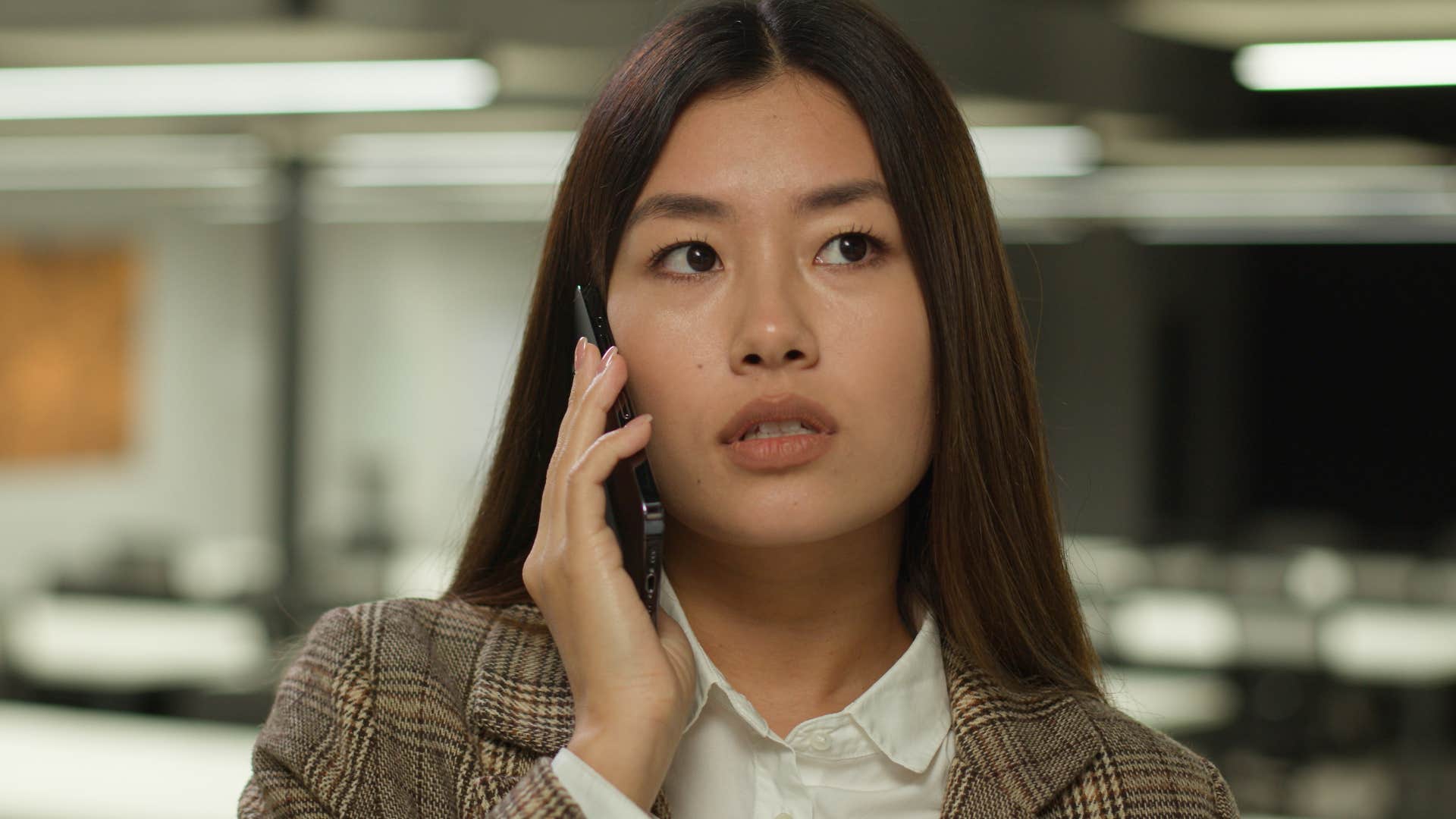11 Things You’ll Notice About Someone Who’d Rather Be Alone Than Tolerate Disrespect
People who prefer their own company to the the company of someone who is disrespectful take specific actions on their own behalf.
 Dany_cn / Shutterstock
Dany_cn / Shutterstock People who would rather be alone than tolerate disrespect are fierce self-advocates who are often painted with a rigid brush, presumed by others who are less self-assured to be hostile or selfish. That characterization couldn’t be farther from their true nature. To the contrary, they are typically emotionally intelligent people with a balance of empathy and self-awareness who both enjoy their alone time and refuse to tolerate toxic people or unsatisfying relationships. These people are able to form meaningful, thoughtful, and warm connections while still prioritizing their own well-being.
Many of the first things you'll notice about someone who’d rather be alone than tolerate disrespect revolve around social situations, such as the way they treat others, the way they speak with new friends, how they prioritize their inner circles, and the manner in which they behave when someone treats them poorly. Their micro-behaviors, expressions, quirks, and favorite phrases paint a picture of internal security and self-worth that’s deeply admirable.
Here are 11 things you’ll notice about someone who’d rather be alone than tolerate disrespect
1. They don’t chase people
 Ground Picture | Shutterstock.com
Ground Picture | Shutterstock.com
The difference between someone full of empathy, sometimes to the point of becoming a people-pleaser, and a balanced emotionally intelligent person is their ability to control their own emotions without input or influence from others. They’re not easily sidetracked or distracted by other people’s discontent or disrespect, but they are aware of it in a socially conscious and aware way.
They know when to help others and when to put themselves first, and it’s this secure and open-minded energy that tends to attract positive people and attention. They don’t chase people, things, relationships, or success, they attract it by looking inward and prioritizing their own well-being.
One of the things you’ll notice about someone who’d rather be alone than tolerate disrespect is that they’re not generally motivated by external validation. They’d prefer to be alone than to seek attention or praise from people who don’t add value to their lives.
2. They’re not afraid to set boundaries
 Fizkes | Shutterstock.com
Fizkes | Shutterstock.com
According to Joe Sanok, host of the The Practice of the Practice podcast, setting boundaries revolves around personal values. Once you have a good idea of what you want, need, and prioritize in your life, setting boundaries becomes a lot easier.
People who would rather be alone than tolerate disrespect may find setting their boundaries initially uncomfortable, but they’re not afraid to tackle this discomfort for the sake of prioritizing themselves and their own values. They’re fierce self-advocates who have the ability to use clear and concise communication when it comes to setting and reinforcing boundaries.
3. They enjoy their alone time
 Mimagephotography | Shutterstock.com
Mimagephotography | Shutterstock.com
According to a study from the University of Reading, people who enjoy their alone time and leverage solitude for personal well-being generally live happier and more fulfilling lives. Filling their alone time with passion projects and personal hobbies, they find space for self-reflection, emotional regulation, and peace, even in a chaotic routine.
It may seem simple, but one of the things you’ll notice about someone who’d rather spend time alone than tolerate disrespect is their comfort with solitude. They don't rely on ’re never superficial relationships to distract themselves, but instead lean into any discomfort surrounding solitude that pushes them to grow into more intuitive, self-aware, and grounded people.
4. They act on red flags early
 Monkey Business Images | Shutterstock.com
Monkey Business Images | Shutterstock.com
Many self-aware and emotionally intelligent people are also socially aware, conscious of energy shifts in conversations, red flags in new people they meet, and the vibe of social situations they’ve just entered into. Their internal security allows them to be truly present with others, noticing red flags and toxic tendencies that other people may not recognize until much later in their relationship.
Their intuition allows them to set boundaries early and even avoid diving into a deeper connection with new friends or partners that may turn out to be unhealthy sooner than later.
5. They don’t entertain drama
 PeopleImages.com - Yuri A | Shutterstock.com
PeopleImages.com - Yuri A | Shutterstock.com
While gossip can be bonding in relationships, but one of the things you’ll notice about someone who’d rather be alone than tolerate disrespect is that they refuse to tolerate drama. They don’t gossip for the sake of making conversation or seek out dramatic conversations for entertainment. They’re self-aware and secure enough to spend time alone rather than feeding into a negative or destructive social interaction.
Many gossipy people are motivated by a need for external validation, but people who would rather be alone than tolerate disrespect don’t try to break other people down for the sake of making themselves look better. They know that attracting and making space for constant negativity only encourages other people to perceive them as less confident and intelligent.
6. They are emotionally resilient
 CarlosBarquero | Shutterstock.com
CarlosBarquero | Shutterstock.com
One of the first things you’ll notice about someone who’d rather be alone than tolerate disrespect is their emotional resilience. They not only have the capacity to regulate their own emotions both when they are alone and when they're around others, but they also face adversity with a kind of optimism that ensures they’re not yearning for support or validation from others to heal.
Their emotional resilience and secure energy is hard to miss, especially in high-stress situations and overly emotional conversations. They know how to maintain a calm and collected demeanor by overcoming their discomfort and managing their emotions in the moment.
7. They move on quietly
 PeopleImages.com - Yuri A | Shutterstock.com
PeopleImages.com - Yuri A | Shutterstock.com
When they've been wronged by someone, people who'd rather be alone than tolerate disrespect don’t seek external praise by relying on gossip or even attention from others by fighting, raising their voices, or blasting the other person online. Instead, they emotionally regulate themselves and move on in silence.
Of course, this looks different for everyone. Some people leverage their personal passions in order to use their alone time to heal, while others invest time in new relationships. The majority of people who refuse to tolerate disrespect don’t linger on a toxic person or relationship for too long. They have self-soothing techniques, an appreciation for solitude, and a general aura of self-confidence and security that drives them through times of adversity, whether it’s the end of a toxic relationship or walking away from an unproductive conversation.
8. They invest energy into deep connections
 Josep Suria | Shutterstock.com
Josep Suria | Shutterstock.com
According to therapist Kathleen Smith, the ability to form deep meaningful connections and break through the surface of superficial relationships can be incredibly uncomfortable, especially for insecure people who struggle with regulating their own emotions and communicating with the people in their lives in healthy ways. However, one of the things you’ll notice about someone who’d rather be alone than tolerate disrespect is their intentionality when it comes to making deep connections.
Of course, most relationships go through a natural evolution that starts with superficial chatter and small talk before becoming deeper, but if this type of person can’t see a deep connection with someone they’re conversing with or seeing, they won’t waste time and energy feeding into its superficiality.
9. They have high standards
 Voronaman | Shutterstock.com
Voronaman | Shutterstock.com
People with high standards don't just set boundaries with and communicate their expectations to peers, co-workers, friends, family members, and partners — they lead by example. They simply treat people how they want to be treated.
If someone isn't returning that same grace, empathy, and intentionality back to them in a relationship, they'd prefer to spend their time alone or investing into more thoughtful relationships than begging someone to show up for them in the right way.
10. They don’t argue to be right
 Branislav Nenin | Shutterstock.com
Branislav Nenin | Shutterstock.com
One of the signs of a person who doesn’t tolerate disrespect and would even rather be alone than waste time, energy, and effort on meaningless connections is their ability to communicate and argue without seeking admiration or praise from others. They don’t argue in order to be right, listen to earn the right to speak, or treat kindness and empathy as transactional traits. They truly communicate and interact with others for the sake of connection.
Whether it’s in the workplace or their personal relationships, a person who’d rather be alone than tolerate disrespect will never argue with someone for the sake of being right or wielding some kind of control over a conversation. They have the self-confidence and internal security to listen to others, even when they don’t agree or even get along.
Of course, they know that their boundaries and expectations are valid, so if they’re arguing with someone about respecting them, it’s definitely not a means of right or wrong, but an opportunity for them to decide whether someone is worthy of their time and attention in the future.
11. They’re comfortable saying no
 MAYA LAB | Shutterstock.com
MAYA LAB | Shutterstock.com
One of the things that’s most easily noticeable about someone who’d rather be alone than tolerate disrespect in their lives and relationships is their comfort saying no. They don’t have a problem with setting expectations and boundaries, even if it means tackling discomfort or making other people look inward.
Of course, people with this kind of emotional intelligence also generally have a strong sense of empathy. They don’t say no for the sake of hurting others, and in some cases, they may even put their needs aside to help others. But when it comes to pushing back against disrespect or toxicity, they put themselves first.
Zayda Slabbekoorn is a staff writer with a bachelor’s degree in social relations & policy and gender studies who focuses on psychology, relationships, self-help, and human interest stories.

